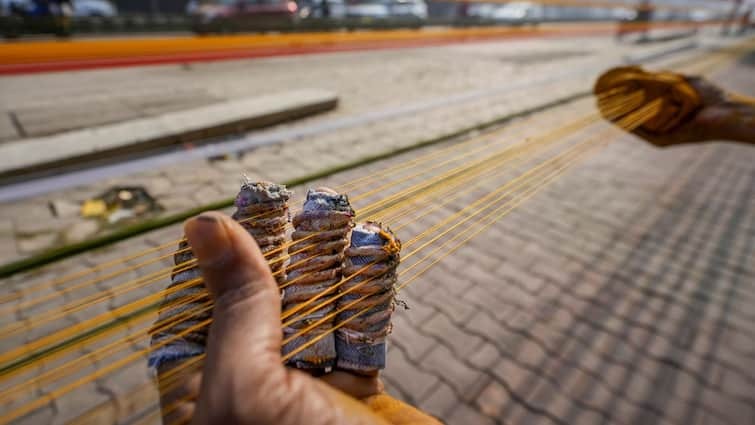
The use of Chinese manjha, a synthetic kite string coated with glass, continues to claim lives and harm wildlife across India. Conservationist Mohammad Dilawar has called for strict policies and robust action to ban the hazardous material and ensure its enforcement. The deadly string has not only resulted in human casualties but has also wreaked havoc on the environment and wildlife, making its elimination an urgent necessity.
The Threat of Chinese Manjha
Chinese manjha, favored for its strength and sharpness, has become a popular yet perilous choice for kite enthusiasts. However, its dangerous properties make it a menace:
Human Lives at Risk: Instances of severe injuries and deaths caused by the razor-sharp string are increasingly reported. People, especially motorcyclists and pedestrians, have suffered fatal cuts, often during festivals like Makar Sankranti.
Wildlife at Peril: Birds, including endangered species, are frequently entangled in the deadly strings. Their wings or necks are often severed, leading to painful deaths.
Environmental Impact: The non-biodegradable nature of Chinese manjha contributes to pollution, clogging water bodies and creating hazards for marine life.
Conservationist Mohammad Dilawar's Call to Action
Mohammad Dilawar, a noted conservationist, has been vocal about the need to ban Chinese manjha comprehensively. According to Dilawar, the issue requires not just a legislative ban but also active enforcement and public awareness to mitigate its widespread effects.
He remarked, “The use of Chinese manjha is not just an environmental issue—it’s a humanitarian crisis. It endangers people, destroys wildlife, and pollutes our ecosystems. A multi-pronged approach involving strict regulations, enforcement, and education is essential.”
Existing Bans and Loopholes
Although several states in India have imposed bans on Chinese manjha, the enforcement remains lax. Illegal manufacturing, sale, and use of the string continue unabated due to a lack of stringent monitoring and awareness among the public.
Implementation Gaps: Despite the bans, Chinese manjha is easily available in black markets. Authorities often struggle with insufficient resources to monitor and curb its sale.
Public Ignorance: Many users are unaware of the legal and moral implications of using Chinese manjha, contributing to its ongoing popularity.
The Impact on Wildlife: A Grim Reality
Wildlife faces a particularly harrowing fate due to Chinese manjha:
- Bird Deaths: Birds often fail to detect the nearly invisible strings, leading to devastating injuries or death.
- Nest Disruption: The strings entangle in trees, disrupting bird habitats and nesting areas.
- Endangered Species: Several rare and protected bird species fall victim to the strings, impacting their already dwindling populations.
Dilawar highlighted this issue, stating, “Every string of Chinese manjha is a potential death trap for our wildlife. If we don’t act now, the ecological consequences could be irreversible.”
The Need for Strict Policies
Dilawar has urged governments to tighten the existing bans and ensure compliance through stricter measures:
- Complete Ban on Manufacturing and Sale: Authorities must focus on shutting down production units and cracking down on illegal markets.
- Heavy Penalties: Harsh fines and legal actions against sellers and users could deter widespread usage.
- Awareness Campaigns: Educating the public about the dangers of Chinese manjha and promoting safer alternatives like cotton threads can bring about behavioral change.
Sustainable Alternatives: A Step Forward
The adoption of eco-friendly and safe alternatives is critical to curbing the menace of Chinese manjha. Traditional cotton strings, devoid of harmful coatings, are a viable and sustainable option for kite enthusiasts.
Dilawar stressed, “Switching to traditional, eco-friendly kite strings can save lives—both human and animal. We need to revive our heritage and prioritize safety.”
Public Participation: A Crucial Component
While government intervention is essential, public participation plays an equally significant role in tackling this issue. By choosing safe alternatives and discouraging the use of Chinese manjha, individuals can contribute to a safer and healthier environment.
Read More: The Hostel Segregation Row What the SC Stay on UGC 2026 Regulations Means for You

 Share
Share


_1531794722_100x75.jpg)
_591321350_100x75.jpg)